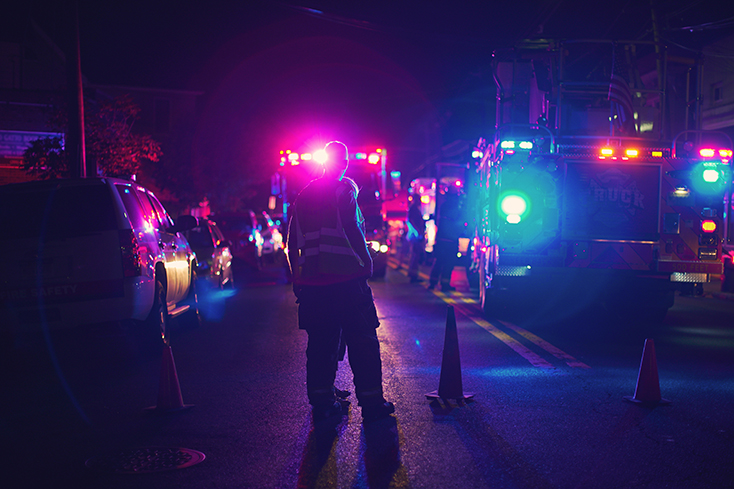March 12, 2021
By Conrad Weaver

NAMI is partnering with #FirstRespondersFirst to raise awareness about the importance of mental health in frontline health care and public safety professionals. In today's blog, filmmaker Conrad Weaver shares details about his upcoming documentary that focuses on first responders that are dealing with PTSD.
PTSD is having an impact on first responders all across the United States and a new documentary is being developed to tell the story. Filmmaker Conrad Weaver is working on the documentary in order to shed light on this ongoing issue that has often been ignored or glossed over.
Post Traumatic Stress is impacting first responders of every type all across the United States and around the world. Fire fighters, police officers, emergency medical personnel, and 911 dispatchers have record cases of PTSD diagnosis, and many are afraid of the very real threat of losing their job if they ask for help.
In 2018, while I was working on the documentary film, Heroin’s Grip, I had the opportunity to witness a fatal overdose scene. While riding with a local police officer we received a call for an overdose. The scene was chaotic. Family members were screaming; EMTs and police officers were trying to keep the scene secure, while the body of the overdose victim lay in the bathroom. The needle and other drug paraphernalia lay near her. She didn’t have a chance. CPR would not revive her, the drugs killed her.
This shook me.
On my way home that afternoon, I started thinking about what I saw, and wondered how the medics and police officers cope with the daily barrage of scenes like this and others that are even worse. Most of us never see or hear first hand the horrible things human beings can do to each other, but first responders do. 911 dispatchers hear the screams and sometimes the final breath of a caller. While the rest of us run away, police officers, firefighters, and paramedics run toward someone’s worst day.
Then COVID-19 came to town, followed by rioting and turmoil on our city streets. The stress on first responders gets worse.
These events motivated me to develop my next film, PTSD911. There have been many films about the impact of trauma on war veterans, but very little has been said about the traumas first responders experience. We expect them to show up when we call and take care of us when we’re at our worst – and they do. They show up, no matter what.
Heroes? Yes! Yet they are human beings just like the rest of us with families, husbands, wives, children, brothers, sisters, and parents. They are firefighters, police officers, emergency medical technicians, paramedics, and 911 dispatchers. We know they are heroes; but we don’t realize that many are in trouble themselves!
Already this year more than 140 police officers have died by suicide. Both firefighters and police officers are more likely to die by suicide than in the line of duty. It’s estimated that 18-24% of dispatchers and 35% of police officers suffer from PTSD. Many first responders self-medicate with alcohol or other self-destructive and abusive behaviors in an effort to cope with the stress and trauma they deal with daily. And unfortunately, many of their agencies are not providing them a supportive environment where they can get help.
If first responders don’t get the help they need and deserve, who will answer the call to YOUR next emergency? Will they be healthy? Our communities, families, and even our very lives often depend on these men and women.
PTSD911 is a documentary film about real people; normal, average human beings who have chosen to work in professions that require above average heroism, fortitude, and resolve. Ultimately PTSD911 sheds light on the hidden and often stigmatized mental health issues impacting many first responders across the world. We want to make a difference. We want to start a national dialogue about this often hidden issue. We want to inspire change.
Our goal for the film is to: 1. Raise awareness and support for first responders suffering from PTSD/PTSI. 2. Reduce the stigma of first responders asking for help. 3. Inspire systemic change in first responder agencies in how they train and support members who suffer from Post Traumatic Stress.
PTSD911 is currently in development and we’re raising funds in order to produce this film. You can learn more about the project, and make a donation at www.ptsd911movie.com
Please follow us on our social media pages:
Facebook.com/ptsd911movie
Twitter.com/ptsd911movie
Instagram.com/ptsd911movie
Conrad Weaver is a filmmaker at ConjoStudios, LLC and is producing and directing PTSD911, his fourth feature-length documentary. In 2015 Conrad received a Mid-America Regional EMMY® Award for his documentary feature, the Great American Wheat Harvest (2014). His most recent documentary, Heroin’s Grip (2018) received numerous awards including a Peer Gold Award from the Television and Internet Video Association in Washington, D.C. Conrad’s experience working with law enforcement and emergency responders while producing Heroin’s Grip inspired him to begin working on PTSD911.
This piece originally appeared on thriveglobal.com.
The Thrive Global Community welcomes voices from many spheres on our open platform. We publish pieces as written by outside contributors with a wide range of opinions, which don’t necessarily reflect our own. Community stories are not commissioned by our editorial team and must meet our guidelines prior to being published.
Submit To The NAMI Blog
We’re always accepting submissions to the NAMI Blog! We feature the latest research, stories of recovery, ways to end stigma and strategies for living well with mental illness. Most importantly: We feature your voices.
LEARN MORE